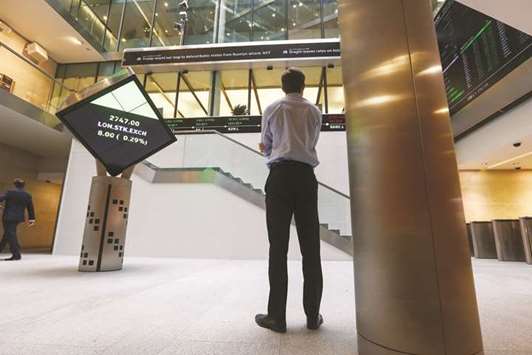World stocks fell and the dollar rose yesterday after Washington threatened to hammer Beijing with tariffs on a further $200bn of Chinese imports, ratcheting up the global trade war.
In London the FTSE 100 closed down 1.3% to 7,591.96 points; Frankfurt — DAX 30 ended down 1.5% to 12,417.l3 points and Paris — CAC 40 closed down 1.5% to 5,353.93 points yesterday.
Washington’s announcement comes just days after the world’s two biggest economies exchanged tit-for-tat measures on a range of goods worth tens of billions of dollars.
“Trade war concerns resurfaced overnight when news broke that the US will announce tariffs on a further $200bn of imports from China with levies of 10%,” said Fawad Razaqzada, a market analyst at Forex.com.
The news shattered the uneasy calm that had descended on markets and allowed them to regain some of the ground lost in recent months on trade war woes.
But now, analysts expect the situation to deteriorate significantly.
“It is going to get much worse before it gets better,” Rabobank senior strategist Michael Every told AFP.
“It will get worse because nobody will back down: it’s a game of geopolitical chicken, and nobody wants to swerve as nobody can afford to lose.”
Crude oil prices also sank heavily on concerns that a trade war could sap demand for the commodity that greases the wheels of the global economy — a concern echoed in Opec’s latest monthly report on Wednesday.
China meanwhile said it was “shocked” and warned it would impose countermeasures “to safeguard the core interests of the country and the fundamental interests of the people”.
Trump had previously warned he would hit a total of $450bn in Chinese goods, which essentially accounts for all the country’s US-bound exports, citing its unfair practices and intellectual property theft.
European stock markets were all well over 1% lower by the close, with Wall Street showing more modest losses approaching midday in New York. “Markets are panicking about the impact of a tit-for-tat trade war on economic growth,” Manulife Asset Management investment analyst William Hamlyn told AFP.
Earlier the trade war jitters also rocked Asia. Tokyo’s Nikkei index dived 1.2%, with exporters hurt as the safehaven yen climbed against the dollar.
Hong Kong lost 1.3% and Shanghai ended off 1.8%.
Stephen Innes, head of Asia-Pacific trade at OANDA, cautioned that “nothing is written in stone and the tariffs are not set to take effect until September”.
He added however that the move was still “a very sobering reality check as to just how fragile sentiment around trade war rhetoric is”.
Observers will be keeping a close eye on the release tomorrow of Chinese trade data, which will give an idea about how the row has affected the country’s exports.

A visitor looks at a ticker of share prices at the London Stock Exchange (file). The FTSE 100 closed down 1.3% to 7,591.96 points yesterday.
